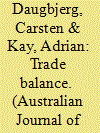| Srl | Item |
| 1 |
ID:
105901


|
|
|
|
|
| Publication |
2011.
|
| Summary/Abstract |
There is now a fairly substantial literature on private global business regulation which focuses on the rise of non-governmental and private regulatory systems alongside traditional state-based systems. These private systems cross national borders and impact on international trade which, in the intergovernmental realm, is governed by the rules of the World Trade Organization (WTO). In this article, the authors argue that while in principle private global regulatory trade regimes do not fall under WTO jurisdiction, in practice they are difficult to keep separate. They therefore have the potential to become a concern within the WTO, not only in legal terms, but also from a political perspective because private global regulatory schemes may (re)introduce the distortions into international trade that WTO rules sought to remove. In some cases, a hybridisation of standards occurs as private standards are recognised by public regulatory structures. National governments may find themselves squeezed between their international obligations and the pressures of their citizens, either to respond to consumer concerns themselves and risk being in conflict with their international obligations or to respond to producers seeking action against 'private red tape' which is nominally beyond the scope of the WTO. The article takes as its case study an international business-to-business agri-food standards body, GLOBALG.A.P., and explores the issues that arise for global trade governance from the growth in private regulation.
|
|
|
|
|
|
|
|
|
|
|
|
|
|
|
|
| 2 |
ID:
127355


|
|
|
|
|
| Publication |
2014.
|
| Summary/Abstract |
The establishment of the World Trade Organization (WTO) has been widely accepted as representing the legalisation of world trading rules. However, it is important to reflect on the limits of this legalisation thesis in terms of the interface between international and domestic policy processes. By locating trading disputes in a political analysis of policy implementation, it is argued that it is difficult to establish conceptually how the WTO dispute settlement system could have authority separate from and above the conventional international politics of trade policy relations. Instead, the article argues that case outcomes should be expected to be largely the product of domestic political institutions and policy processes, and how these intersect with developments in the WTO dispute settlement system. Brief studies of the Australian government's dispute settlement strategy and two high-profile WTO disputes-the US upland cotton and European Union sugar cases-serve to suggest that the authority of international trade law is not as significant as assumed by the legalisation thesis. Rather, domestic politics and institutions have an important impact on the outcome of trade disputes.
|
|
|
|
|
|
|
|
|
|
|
|
|
|
|
|